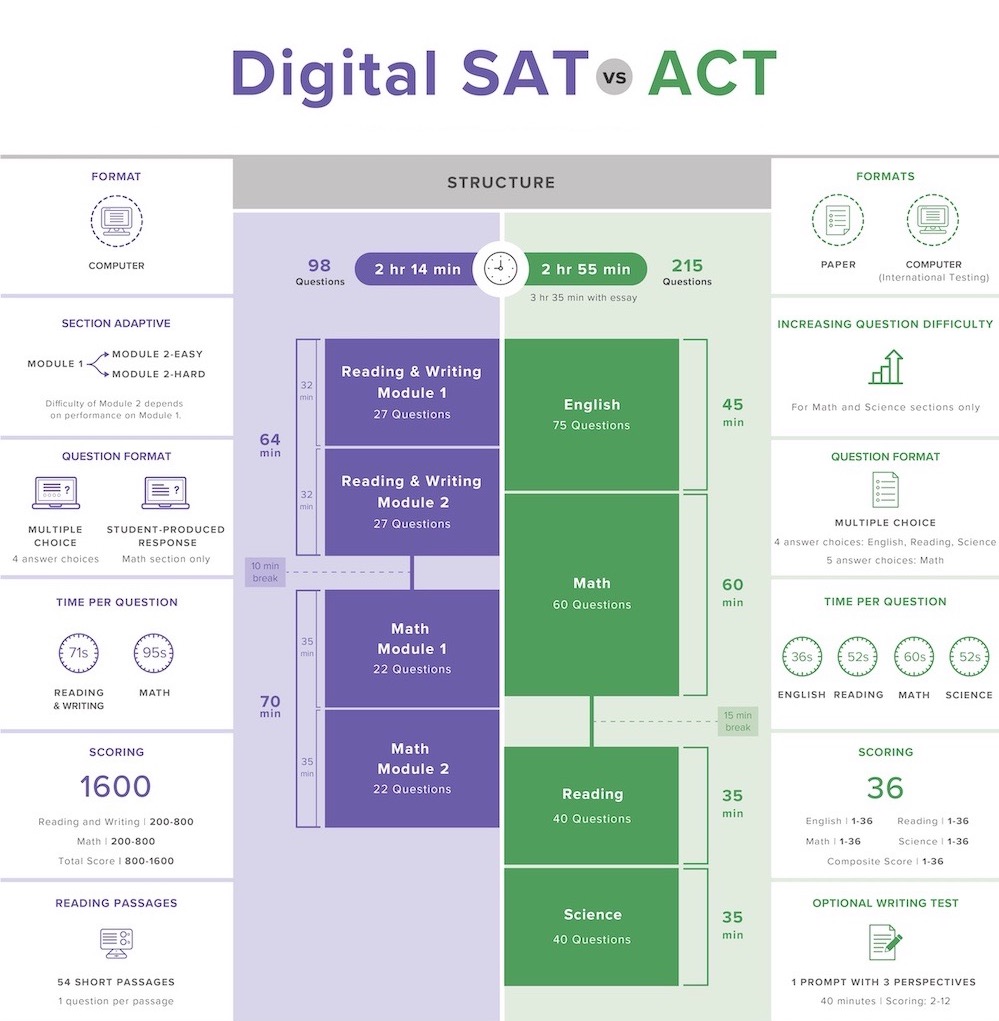FAQs
How does the Digital SAT differ from the old Paper SAT?
To understand how the Digital SAT differs from the old Paper SAT, please see my blog post here:
THE DIGITAL SAT IS HERE – AND WE’RE READY
By Dr. Al Benthall
Benthall Test Prep
November 30, 2023
https://benthalltestprep.com/the-digital-sat-is-here/
What are the main differences between the SAT and ACT?
As of Spring 2024, the Digital SAT now differs from the ACT in more ways than ever. To start with, the Digital SAT is a much shorter test than the ACT. With only 98 questions, the Digital SAT allows 2 hours 14 minutes. With 215 questions, the ACT allows almost 3 hours.
In addition, the Digital SAT gives students more time than the ACT on all areas of the test. For example, on the newly combined Reading and Writing Test, the Digital SAT now gives students an average of 73 seconds per question. On the ACT English Test, students receive 36 seconds per question, and on the ACT Reading Test they receive 52 seconds per question, which also holds for the ACT Science Test. The same time difference also applies to the Math sections of both tests. The Digital SAT Math Test provides 95 seconds per question, whereas the ACT Math Test provides 60 seconds per question. Clearly, students who experience time constraints as a serious obstacle should lean toward the SAT.
Because of the shorter test and increased time per question, most students have reported that the Digital SAT feels “easier” than the ACT. However, the Digital SAT Math Test can still feel more challenging than the ACT Math Test. For example, the ACT gives 60 math questions, all of which are multiple choice. This means that a student can always guess and have at least a 1/5 chance of getting the answer right. By contrast, the Digital SAT gives 44 math questions, but 25% of these are “student produced response” questions, where the student has to bubble in the exact digits of the correct answer. Guessing is virtually impossible on these questions, making the SAT Math section feel a bit more challenging.
Finally, the ACT Science Test remains the biggest difference between the two tests, insofar as the Digital SAT has no Science Test. However, the Digital SAT has incorporated a number of science-based passages into its reading sections, even though these passages are not as scientifically rigorous as the ACT Science Test. Having said that, the ACT Science Test remains fundamentally a READING test with charts and graphs, and not a math test. Students who are strong at reading typically do well on the ACT Science Test.
As a result of these considerations, I frequently give parents and students the following simple advice: if you are challenged at reading and proficient at math, take the SAT. Conversely, if you are proficient at reading and challenged at math, take the ACT.
For a more in-depth comparison of the Digital SAT vs. the ACT, here’s a helpful infographic:

Do some schools require both the SAT and the ACT? Should I prep for both?
The short answer to both questions is “absolutely not!” No schools require students to submit both SAT and ACT scores. All schools accept either the SAT or the ACT. While it may be helpful to take each test once to ascertain the best fit for you, it’s simply not worth the time and energy to prep for both tests. Pick one test and master it.
Should I prepare for the PSAT / PACT?
In general, prepping for the PSAT or PACT is an excellent idea. The PSAT is usually given during the Junior year of high school. If you achieve a top score on the PSAT, you can qualify for a National Merit Scholarship (the PACT does not qualify students for any scholarship programs). Although the PSAT and PACT are both only 2/3 as long as the SAT or ACT, they are essentially the same test, minus the Essay portion. Studying for the PSAT or PACT will give you early warning signs in areas where you need to improve, allowing you to work on these weak spots in plenty of time to boost your real SAT or ACT scores.
When should I take the SAT / ACT?
To achieve your best SAT or ACT score, start early. Many top-scoring students take the test during their Junior year in October, November, or December. If you perform strongly on one section, you can then focus your energy on sections where you need more work. This strategy allows you to use your prep time and energy more efficiently. After taking the test in the Fall, you can then take it again in the Spring, and once more during the Fall of your senior year if need be.
How many times should I take the SAT / ACT?
The short answer is that you should keep taking the SAT or ACT until you hit your target score. Taking the test three times is very common, while some students take it four times or more. But beware. Taking the test over and over again will not necessarily boost your performance. In fact, becoming obsessed with the test can actually lower your scores. Most students should plan to take the test two or three times, taking it a fourth time if necessary.
What is Super Scoring?
Most colleges take a student’s highest SAT scores in Reading/Writing and Math from multiple tests and add them together to form a composite Super Score. Many do the same with the ACT, averaging your top scores in English, Math, Reading, and Science to form a composite Super Score. For this reason, taking the SAT or ACT multiple times is generally a good idea. Historically, more schools have Super Scored the SAT than the ACT, although more schools are now starting to Super Score the ACT as well. When in doubt, always check with each college’s admissions office to ascertain their policy on SAT and ACT Super Scoring.
How many times should I take the SAT / ACT?
The short answer is that you should keep taking the SAT or ACT until you hit your target score. Taking the test three times is very common, while some students take it four times or more. But beware. Taking the test over and over again will not necessarily boost your performance. In fact, becoming obsessed with the test can actually lower your scores. Most students should plan to take the test two or three times, taking it a fourth time if necessary.
What is Score Choice?
Score Choice allows you to choose which SAT or ACT scores you send to colleges. Simply choose the scores from your best test dates and have them sent to the colleges of your choice. Bear in mind, however, that some colleges and scholarship programs require you to submit scores from all test dates.
Do some colleges not require SAT / ACT scores?
At last count, there are more than 900 colleges and universities that have a “test-optional” policy. However, even these colleges will accept standardized test scores as part of your application. As a result, a high SAT or ACT score can still improve your chances of admission in many of these “test-optional” schools. Of course, most students do not apply only to test-optional schools, which means that earning the highest possible SAT or ACT score is essential for college-bound high school students.
Should I take the SAT Essay / ACT Writing Test?
Since the SAT no longer includes an Essay, this question only applies to the ACT. Because only a handful of schools now require the ACT Writing Test, students should only take the ACT with Writing Test if the colleges to which they’re applying require it. To be on the safe side, check the website or contact the admissions office for schools to which you’re applying and make sure the ACT Writing Test is not required or recommended.
